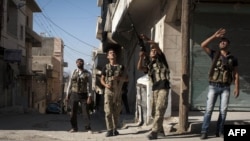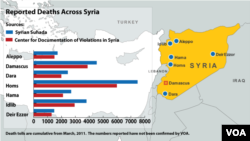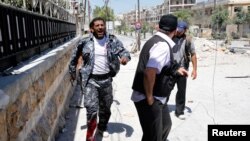Syrian government forces intensified efforts Thursday to seize control of parts of the capital and its surrounding areas from rebel fighters.
The Syrian Observatory for Human Rights said the military bombed Daraya, on the edge of Damascus, and nearby Moadamiyeh. The London-based group also reported house-to-house raids in Daraya and fierce clashes in the Hajar al-Aswad district of Damascus.
The Observatory said about 100 people were killed in violence across Syria Thursday, including nearly 50 civilians in Damascus and its surrounding areas.
The death toll also included more than 20 government troops.
Fighting also continued in the northern city of Aleppo, where some foreign fighters are reported to have joined the opposition.
Fresh fighting between pro- and anti-Assad gunmen erupted for a fourth day Thursday in the northern Lebanese city of Tripoli, leaving one dead and at least two wounded. The clashes breached a truce agreed to by political leaders less than 24 hours earlier in a bid to halt fighting fueled by tensions in neighboring Syria.
Sunni Muslims have led the revolt against Syria's President Bashar al-Assad, whose minority Alawite sect has mostly stood with him. Sunni-Alawite tensions have been growing in parts of Lebanon as well, like Tripoli, where the two groups live in neighboring districts.
"Operational planning" meeting in Turkey
In Ankara, Turkish and U.S. officials are holding their first "operational planning" meeting aimed at bringing about the end of Assad's embattled regime. Thursday's deliberations are expected to coordinate military, intelligence and political responses to the Syrian crisis.
A Turkish foreign ministry official, Halit Cevik, and U.S. Ambassador Elisabeth Jones are leading the delegations made up of intelligence agents, military officials and diplomats.
Meanwhile, the rights group Amnesty International said artillery, mortar fire and airstrikes by Syrian government forces in the northern city of Aleppo are killing mostly civilians, including children.
In a report released Thursday, Amnesty said air and artillery strikes against residential neighborhoods are indiscriminate attacks that seriously endanger civilians.
Government troops and opposition forces have been fighting in Aleppo for a month after rebels took over several neighborhoods.
Syrian reaction to Japanese journalist's death
Speaking in Damascus, Syrian Deputy Foreign Minister Faisal Miqdad expressed sorrow for the death of Japanese journalist Mika Yamamoto, who was killed earlier this week when she was caught in a gunfight between rebel and government forces in Aleppo.
But Miqdad was also critical of the way Yamamoto entered the country, and he said Syria's government is not to blame for her death.
"When a certain journalist acts in an irresponsible way he/she would expect all these hard probabilities," he said. "But the Syrian government is definitely not responsible for this, and I guess some armed gangs committed levels of crime including killing such an innocent person and then accusing the government of it."
Yamamoto was traveling with rebels at the time she was killed. Two Alhurra TV journalists who were with her are still missing.
Alhurra's parent organization (BBG) - which also oversees the Voice of America - has urged the Syrian government to ensure the safety of the two journalists, correspondent Bashar Fahmi and cameraman Cuneyt Unal.
U.N. sounds alarm on humanitarian situation
In New York Wednesday, United Nations political chief Jeffrey Feltman told the Security Council the U.N. views the rapidly deteriorating humanitarian situation in Syria "with growing alarm." He said about 2.5 million people are in need of humanitarian assistance while the number of displaced people in Syria and the flow of refugees to neighboring countries is growing.
Feltman also accused Iran of supplying Syria with weapons, backing charges by Western officials that Tehran is providing funds, arms and intelligence support to Assad in his bid to crush the opposition. Syrian rebels also say the Islamic Republic has sent Revolutionary Guards and Hezbollah fighters to Syria.
The U.N. emergency relief coordinator, Valerie Amos, who was in Syria last week, said U.N. agencies last month provided food for more than 820,000 people across Syria. She said the humanitarian situation there has worsened since a previous visit in March.
Meanwhile, British Prime Minister David Cameron and U.S. President Barack Obama warned Wednesday they would be forced to consider a new course of action if Syria threatens to use chemical weapons on rebel fighters.
The two leaders agreed during a telephone call that "the use - or threat - of chemical weapons was completely unacceptable and would force them to revisit their approach so far."
Some information for this report provided by AFP, AP and Reuters.
Photo Gallery: Latest Images from Syria
Timeline of Syrian Conflict
The Syrian Observatory for Human Rights said the military bombed Daraya, on the edge of Damascus, and nearby Moadamiyeh. The London-based group also reported house-to-house raids in Daraya and fierce clashes in the Hajar al-Aswad district of Damascus.
The Observatory said about 100 people were killed in violence across Syria Thursday, including nearly 50 civilians in Damascus and its surrounding areas.
The death toll also included more than 20 government troops.
Fighting also continued in the northern city of Aleppo, where some foreign fighters are reported to have joined the opposition.
Fresh fighting between pro- and anti-Assad gunmen erupted for a fourth day Thursday in the northern Lebanese city of Tripoli, leaving one dead and at least two wounded. The clashes breached a truce agreed to by political leaders less than 24 hours earlier in a bid to halt fighting fueled by tensions in neighboring Syria.
Sunni Muslims have led the revolt against Syria's President Bashar al-Assad, whose minority Alawite sect has mostly stood with him. Sunni-Alawite tensions have been growing in parts of Lebanon as well, like Tripoli, where the two groups live in neighboring districts.
"Operational planning" meeting in Turkey
In Ankara, Turkish and U.S. officials are holding their first "operational planning" meeting aimed at bringing about the end of Assad's embattled regime. Thursday's deliberations are expected to coordinate military, intelligence and political responses to the Syrian crisis.
A Turkish foreign ministry official, Halit Cevik, and U.S. Ambassador Elisabeth Jones are leading the delegations made up of intelligence agents, military officials and diplomats.
Meanwhile, the rights group Amnesty International said artillery, mortar fire and airstrikes by Syrian government forces in the northern city of Aleppo are killing mostly civilians, including children.
In a report released Thursday, Amnesty said air and artillery strikes against residential neighborhoods are indiscriminate attacks that seriously endanger civilians.
Government troops and opposition forces have been fighting in Aleppo for a month after rebels took over several neighborhoods.
Syrian reaction to Japanese journalist's death
Speaking in Damascus, Syrian Deputy Foreign Minister Faisal Miqdad expressed sorrow for the death of Japanese journalist Mika Yamamoto, who was killed earlier this week when she was caught in a gunfight between rebel and government forces in Aleppo.
But Miqdad was also critical of the way Yamamoto entered the country, and he said Syria's government is not to blame for her death.
"When a certain journalist acts in an irresponsible way he/she would expect all these hard probabilities," he said. "But the Syrian government is definitely not responsible for this, and I guess some armed gangs committed levels of crime including killing such an innocent person and then accusing the government of it."
Yamamoto was traveling with rebels at the time she was killed. Two Alhurra TV journalists who were with her are still missing.
Alhurra's parent organization (BBG) - which also oversees the Voice of America - has urged the Syrian government to ensure the safety of the two journalists, correspondent Bashar Fahmi and cameraman Cuneyt Unal.
U.N. sounds alarm on humanitarian situation
In New York Wednesday, United Nations political chief Jeffrey Feltman told the Security Council the U.N. views the rapidly deteriorating humanitarian situation in Syria "with growing alarm." He said about 2.5 million people are in need of humanitarian assistance while the number of displaced people in Syria and the flow of refugees to neighboring countries is growing.
Feltman also accused Iran of supplying Syria with weapons, backing charges by Western officials that Tehran is providing funds, arms and intelligence support to Assad in his bid to crush the opposition. Syrian rebels also say the Islamic Republic has sent Revolutionary Guards and Hezbollah fighters to Syria.
The U.N. emergency relief coordinator, Valerie Amos, who was in Syria last week, said U.N. agencies last month provided food for more than 820,000 people across Syria. She said the humanitarian situation there has worsened since a previous visit in March.
Meanwhile, British Prime Minister David Cameron and U.S. President Barack Obama warned Wednesday they would be forced to consider a new course of action if Syria threatens to use chemical weapons on rebel fighters.
The two leaders agreed during a telephone call that "the use - or threat - of chemical weapons was completely unacceptable and would force them to revisit their approach so far."
Some information for this report provided by AFP, AP and Reuters.
Photo Gallery: Latest Images from Syria
Timeline of Syrian Conflict
Loading...







